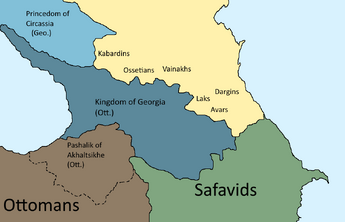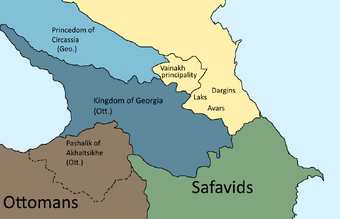Ruxadzegio4 (talk | contribs) mNo edit summary Tag: Visual edit |
Ruxadzegio4 (talk | contribs) No edit summary Tag: Visual edit |
||
| Line 50: | Line 50: | ||
by 1650 Georgia was a proper European country. Close ties with Poland helped reconnect with the rest of Europe. Finally free from Turco-Persian burden (de facto), Georgia was able focus on science, literature and art, Basically Georgia had entered Renaissance. Frustrated Turks requested that North Caucasian tribes raid into Georgia. Kakheti was always targeted by various Mountainous tribes as it was closest to their home. It was impossible to Attack attack Laks and Avars directly, since crossing Caucasus with a giant army would be mission impossible, Only way to Attack them was through Kabardia, but Alexander was afraid of losing support of Circassian Chiefs who were vassals of his brother Mamuka - but in 1654, Kabardins along with Ossetians invaded Mamuka's domain. With help from Alexander, Mamuka managed to conquer Kabardia and Ossetia. Vainakh tribes offered a treaty of friendship and non-aggression to Alexander, which he accepted. Later that year, Alexander, along with Vainakh warriors attacked and subjugated hostile Larks and Avars. Raids finally ended. |
by 1650 Georgia was a proper European country. Close ties with Poland helped reconnect with the rest of Europe. Finally free from Turco-Persian burden (de facto), Georgia was able focus on science, literature and art, Basically Georgia had entered Renaissance. Frustrated Turks requested that North Caucasian tribes raid into Georgia. Kakheti was always targeted by various Mountainous tribes as it was closest to their home. It was impossible to Attack attack Laks and Avars directly, since crossing Caucasus with a giant army would be mission impossible, Only way to Attack them was through Kabardia, but Alexander was afraid of losing support of Circassian Chiefs who were vassals of his brother Mamuka - but in 1654, Kabardins along with Ossetians invaded Mamuka's domain. With help from Alexander, Mamuka managed to conquer Kabardia and Ossetia. Vainakh tribes offered a treaty of friendship and non-aggression to Alexander, which he accepted. Later that year, Alexander, along with Vainakh warriors attacked and subjugated hostile Larks and Avars. Raids finally ended. |
||
[[File:1655.png|thumb|340x340px]] |
[[File:1655.png|thumb|340x340px]] |
||
| + | |||
| − | [[Category:Second Unification of Georgia]] |
||
| + | === Second Golden Age === |
||
| + | Georgia managed to gain full independence from the Ottoman Empire in 1699. Georgia became a prominent European country which attracted interest of Multiple Great Powers. Georgia suffered greatly during the Age of Division which resulted in Loss of land and crumbling of the Economy, but nevertheless t regained it's former position. Georgia temporarily allied itself with russia against the Ottoman but the relations with the former ally began to deteriorate afterwards.Georgia began looking towards new allies as it's former ally:Poland, had become seriously weak and couldn't provide support against any foreign encroachments. Georgia allied itself with Prussia. Georgia provided auxiliary forces[[Category:Second Unification of Georgia]] |
||
[[Category:Georgia]] |
[[Category:Georgia]] |
||
Revision as of 17:07, 14 November 2018
Georgia
Battle of Tabakhmela
News of Unification of Georgia reached the Safavid court. They realized that if they didn't take action they would lose foothold in Transcaucasia, they decided to depose Alexander and place Kartli under direct Persian rule. A certain commander known as Jahangir was put in command of a Large Qizilbash army. Jahangir Marched slowly towards Caucasus. Near Erivan he was joined by Governors of Erivan, Ganja and Qarabagh, and together they continued North. Alexander knew that he could face such a big coalition, so he sent small cavalry divisions to pillage Erivan and Ganja. Near border of Georgia, Governors were notified that their lands were being attacked and they had to abandon the campaign. Now it was Jahangir and Governor of Qarabagh versus Alexander. In order to slow down his opponents, Alexander employed The Scorched Earth tactic. Constant partisan attacks and lack of supplies broke the Safavid fighting spirit, and by the time they had reached Tbilisi, the morale had gone down the drain. Alexander and his forces were entrenched near Tabakhmela, while Jahangir set up a camp south of Tbilisi. On September 18, early in the morning, while Qizilbash were still asleep, a small Georgian cavalry regiment swept through the Persian camp. Once Persians realized what was going on, they went on to chase the Georgians, who feigned retreat. Georgians forced the Persians to chase them uphill to Tabakhmela, and once the unsuspecting Persians reached top of the hill, They got shot down by Georgian Musketeers. Governor of Qarabagh was killed in action, causing his men to panic and retreat downhill, stamping their comrades in process. Jahangir, who was not involved in the battle (and escaped unscathed), only managed to save a small portion of his, realizing that battle was over, he retreated towards Kakheti. Alexandre's Cavalry routed the remainder of Qarabagh army, slaughtering many and taking even more hostages.
| Battle of Tabakhmela | |||||||||
|---|---|---|---|---|---|---|---|---|---|
|
|||||||||
| Belligerents | |||||||||
| Commanders and leaders | |||||||||
| Strength | |||||||||
| 25,000 | 70,000 | ||||||||
Aftermath
Jahangir retreated to Kakheti, where he demanded Kakhetian King's assistance, upon the refusal, Jahangir murdered king Teimuraz I and fortified himself in Gremi. At the request of Kakhetian nobles, Alexandre invaded Kakheti and Murdered Jahangir. He then proceeded to annex rightful Georgian lands from Safavids. Safavids were planing another Invasion but Their plans were thwarted by Mughal Invasion. Peace treaty was signed with Georgia, recognizing their gains.

Subjugation of North Caucasians.
by 1650 Georgia was a proper European country. Close ties with Poland helped reconnect with the rest of Europe. Finally free from Turco-Persian burden (de facto), Georgia was able focus on science, literature and art, Basically Georgia had entered Renaissance. Frustrated Turks requested that North Caucasian tribes raid into Georgia. Kakheti was always targeted by various Mountainous tribes as it was closest to their home. It was impossible to Attack attack Laks and Avars directly, since crossing Caucasus with a giant army would be mission impossible, Only way to Attack them was through Kabardia, but Alexander was afraid of losing support of Circassian Chiefs who were vassals of his brother Mamuka - but in 1654, Kabardins along with Ossetians invaded Mamuka's domain. With help from Alexander, Mamuka managed to conquer Kabardia and Ossetia. Vainakh tribes offered a treaty of friendship and non-aggression to Alexander, which he accepted. Later that year, Alexander, along with Vainakh warriors attacked and subjugated hostile Larks and Avars. Raids finally ended.

Second Golden Age
Georgia managed to gain full independence from the Ottoman Empire in 1699. Georgia became a prominent European country which attracted interest of Multiple Great Powers. Georgia suffered greatly during the Age of Division which resulted in Loss of land and crumbling of the Economy, but nevertheless t regained it's former position. Georgia temporarily allied itself with russia against the Ottoman but the relations with the former ally began to deteriorate afterwards.Georgia began looking towards new allies as it's former ally:Poland, had become seriously weak and couldn't provide support against any foreign encroachments. Georgia allied itself with Prussia. Georgia provided auxiliary forces



